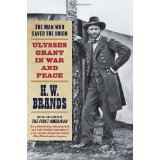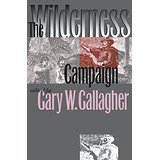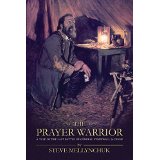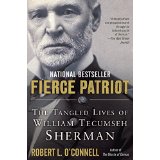Title: The Man Who Saved the Union: Ulysses Grant in War and Peace
Author: H. W. Brands
Publisher: Doubleday; NY, NY; 2012
Best Price/s: Amazon.com – $11.58 (soft cover) – 21.83 (hard)
H. W. Brands’ The Man Who Saved the Union:… is a well-written account of a man whom many people think they know, but have little understanding of the events and motivations which drove him. Brands does an excellent job of telling his story and the stories of those who intersected his life. That he doesn’t distract us with footnotes but puts them all at the end of the book, is a kindness that makes the reading of the story so much more enjoyable.
The first section describes a young Hiram Ulysses Grant, shaped by his respect for his father, his love for his young wife Julia, and his desire to provide for his growing family. He had no interest in going to West Point at first, but went at his father’s insistence, because he had gotten him the appointment. Grant was a mediocre student, but did excel in horsemanship and enjoyed meeting the great men of his day when they visited the Point. It was at West Point that a clerical error changed his name to Ulysses S. Grant and at his first posting in St Louis that he met his darling Julia, who became the center of his life.
Unfortunately, the war with Mexico called him away and many of his comrades would later be men that he fought with or against. He served under Generals Taylor and Scott and while appreciating their differences, he was definitely influenced by Taylor’s relaxed manner around his men when in camp.
When he returned from that war he married Julia and began a family. His next significant posting came after gold was found in California. Sent there alone, he ended up first in Oregon and then northern California. The monotony of the post bored him while he worried about his family so far away. Because of the distance and the remoteness, he went weeks and months without a letter arriving to give him any news of his loved ones. He finally began to drink out of boredom and misery, but this only resulted in his decision to resign after an incident.
He came back and tried his hand at farming which ultimately failed, in part because of the financial crash of 1857 and also because of malaria. After several more failed attempts to provide for his growing family, he was reduced to asking for a job in his father leather store in Galena, IL, working for his two younger brothers. And then war broke out….
This second portion of his life is well known and many volumes have been written about Grant during the Civil War. I will only add these observations:
- Grant learned from his early mistakes and did not repeat them;
- He was able to listen and gather information from others, but would then make a quick decision of how to proceed;
- He inspired his soldiers not by pomp and decorum but by constantly pursuing the enemy and winning battles;
- He was not a butcher who didn’t care for his men, but rather he wanted to end the war and the fighting as soon as possible, in any way possible, and he knew this would require a loss of life.
- He came to believe that slavery must be abolished and that Colored Troops deserved the same rights as the white troops. He would remain one of the best friends of the Negro people for the next thirty years.
In the third section, Brands tells us in some detail of Grant’s presidency, followed by international travels and more failed business ventures. After Lincoln’s assassination, his vice president Andrew Johnson, a Southerner, took the reins and began to undo several of Lincoln’s policies. Johnson favored the southern aristocracy, permitting them to resume much of their political power at the expense of the newly freed slaves. Several fraternal orders arose during this period, including the KKK, for the dual purpose of keeping the Negroes and the white Republicans intimidated and away from the voting places. By 1868, Johnson faced impeachment from an angry northern public.
Without even running, Grant was nominated and elected in ’68 to the first of two terms. The first term actually went very well for this man who had saved the Union. He reversed some of the damage done by Johnson, convinced Nathan B. Forest to disband the KKK, tried to negotiate fair treaties for the native Indians that would protect them, negotiated for the annexation of the Dominican Republic, and tried to establish a Civil Service examination to weed out the thousands of incompetents who came demanding government jobs.
In his second term, he began to have opposition to some of his programs. Because of the lack of a Civil Service system, every president had to appoint men to fill many government jobs. Some of these were corrupt while others were just inept. In truth, he served well, but in the years after he had left office, the political tides changed and both Republicans and Democrats unjustly vilified him for their purposes and candidates at the time.
To close, it was Grant’s good friend Samuel Clemens (a.k.a. Mark Twain) who encouraged him to write his memoirs as he was dying of cancer. Clemens promised to publish the book and give 3/4s of the proceeds to Grant’s wife so that she would be financially taken care of for life. And she was.
I do recommend taking the time to read this excellent volume by Brands, as the reader is sure to learn some additional things about this man who so affected our history and even our present day government.



Recent Comments